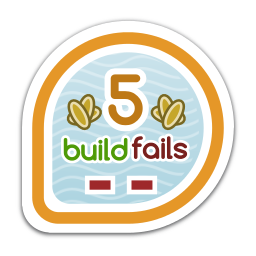m (content moved from old user page) |
|||
| (74 intermediate revisions by the same user not shown) | |||
| Line 1: | Line 1: | ||
= David | = David Aquilina = | ||
== Contact | == Contact Info == | ||
E-mail: dwa (at) fedoraproject.org | |||
IRC: 'dwa' on freenode | |||
* | Everyone loves badges: | ||
* Fedora and | {{ #fedorabadges: dwa }} | ||
== Secondary Arch Releng == | |||
=== Builds === | |||
==== Principles ==== | |||
* Never build an NVR before it's built on primary (koji.fedoraproject.org). The code used for a given NVR must match exactly between primary and secondary. koji-shadow uses source RPMs pulled from koji.fp.o, when building manually you should use a git url from pkgs.fedoraproject.org (e.g. git://pkgs.fedoraproject.org/kernel?#5394ba72a9d27667d10801685f71c003a7e205bc for kernel-3.9.6-301.fc19 ) | |||
* Never build 'real' (i.e. not scratch) packages with code that hasn't been committed to pkgs.fp.o. | |||
** Milestone composes (TCs & RCs for alpha, beta and GA) should only ever be done with real packages. Including scratch builds in test composes should be kept to an absolute minimum. | |||
* Buildroots and dependencies should match primary as closely as possible. koji-shadow enforces this automatically, the only time you should build a package manually is when something is broken in a way which prevents koji-shadow from building it. | |||
** e.g. if eclipse-4.3.0-0.60.git7bf397.fc19 had a previous, broken-on-secondary version of eclipse in its buildroot, you should build eclipse-4.3.0-0.60.git7bf397.fc19 manually. | |||
** 'build a package manually' means submitting the build to ppc.koji.fp.o with e.g. <code>ppc-koji build f19 git://blah</code> | |||
** If not broken, build a single package with <code>koji-shadow -c <config file> --build <nvr> <release>-build</code> | |||
*** This assumes <config file> specifies prefer_new and import_noarch, and you're using a koji-shadow from git which supports those options in conjunction with building a single NVR (previous versions of koji-shadow, using '--build <nvr>' caused it to match the buildroot exactly). | |||
*** e.g.: <code>/home/dwa/shadow/koji-shadow -c /home/dwa/shadow/f19.conf --build gnome-initial-setup-0.12-1.fc19 f19-build</code> | |||
==== Methodology ==== | |||
# koji-stalk.py monitors fedmsg for completed build notifications from koji.fp.o. | |||
#* koji-stalk.py is run on the hub out of a screen session by dwa | |||
#* Use <code>/home/dwa/shadow/f19.conf</code> as the koji-shadow configuration file. | |||
#* Use <code>/home/dwa/shadow/koji-shadow</code> as the koji-shadow binary. | |||
#* <code>./koji-stalk.py -c /home/dwa/shadow/f19.conf --shadow /home/dwa/shadow/koji-shadow</code> | |||
# When it receives a build notification, it kicks off koji-shadow for that NVR, and tags it into the -updates-candidate tag. | |||
# Tags are automatically synced with primary | |||
#* Tags are synced out of cron on the hub by ppc-sync-tagged-primary.py | |||
#* dgilmore also runs sync-tagged-primary against all arches after every stable push. | |||
# Signing the tags and mashing/pushing updates are all manually done. | |||
* [https://git.fedorahosted.org/cgit/releng/tree/scripts/koji-stalk.py koji-stalk.py] should be the primary way that builds happen. | |||
* The [http://ppc.koji.fedoraproject.org/reports/koji-stalk/KojiStalk.log koji-stalk logs] should be monitored for failed builds to know where to investigate problems. | |||
** If an NVR fails to build, the output from koji-shadow is saved in <code>http://ppc.koji.fedoraproject.org/reports/koji-stalk/</code>. | |||
** koji-stalk.py will print any backlog for each distro, if any, every 10 minutes. | |||
* koji-shadow should be occasionally manually run against the stable tags (and possibly updates-testing?) to catch any builds that might have been missed by the script (e.g. it crashed, or was stopped for system maintenance or to update the script). | |||
** stable tags are the release tag pre-GA (e.g. 'f19'), and the updates tags (e.g. 'f18-updates') post-GA. | |||
** koji-stalk.py builds ahead of updates-candidate, so if unknown builds are missed the occasional runs against stable or updates-testing will eventually, but not immediately, catch them. | |||
** koji-stalk prints its queues (if any) every 10 minutes in the log, should you need to stop the script to update it. | |||
=== Compose & Build scripts === | |||
* Scripts for mashing & composing milestones, bleed repos, and nightly images are [http://dwa.fedorapeople.org/secondary-releng on my people page]. | |||
** <code>mash-milestone.sh</code> mashes a repo for a particular release '''while enforcing strict signing''', unlike buildbranched. Edit the DATE variable before running it. | |||
** <code>compose.sh</code> composes test releases. It uses the fedora-install-fedora.ks which points to the branched & bleed repos, and does not create source or debuginfo trees. Edit the DATE variable before running it. | |||
** <code>compose-milestone.sh</code> composes milestone releases. Ensure there's a $milestone-fedora-install-fedora.ks which points to a repo which was mashed with strict signing (such as what <code>mash-milestone.sh</code> creates). Edit the DATE and MILESTONE variables before running it. | |||
** <code>make-bleed.sh</code> creates a bleed repo of packages from the PKGS variable. Edit the PKGS variable before running it. | |||
** All of the above should be run from ppc-composer. | |||
* [https://git.fedorahosted.org/cgit/releng/tree/scripts/koji-stalk.py koji-stalk.py] is a script for monitoring fedmsg and kicking off builds as soon as they finish on primary. | |||
* All build scripts (koji-stalk.py and koji-shadow) are currently run from the hub. | |||
* All compose and mash scripts, pushing updates, and signing are done from the composer. | |||
* koji-stalk.py and sigulsign_unsigned.py are available from the [https://git.fedorahosted.org/cgit/releng releng git repo]. | |||
=== TC & RC Composes === | |||
* TCs are Test Composes. They will never be formal releases so the only thing that makes them different from daily ISOs is the package list for the bleed repo is taken from primary's releng ticket for that release/milestone, e.g. https://fedorahosted.org/rel-eng/ticket/5623 | |||
*# Grab the list of NVRs from the ticket, then edit <code>make-bleed.sh</code> and put that (space separated) list in the PKGS variable. | |||
*# To make life easier for you down the road, it's best to sign those builds now. Run <code>sigulsign_unsigned.py --arch ppc -v fedora-19-secondary <space separated list of NVRs></code>, and take note of any builds which don't exist yet (then build them, and sign). | |||
*#Run <code>make-bleed.sh -s ba094068</code> to build the bleed repos. | |||
*#* <code>ba094068</code> is the key ID for fedora-19-secondary. As an argument, it is case-sensitive. | |||
*# Edit <code>compose.sh</code> to reflect the correct <code>DATE</code> label (e.g. '''f19-20130618-GA-TC5''') and run it. | |||
* RCs are Release Candidates. They may become formal releases, so we need to ensure that all packages in an RC are signed. RCs also have full source and debuginfo trees generated as well, so they take a little longer to make. | |||
*# Sign the entire tag for the release. | |||
*#* <code>sigulsign_unsigned.py --arch ppc -v --write --tag f19 fedora-19-secondary</code> | |||
*# Ensure the bleed repo only contains signed packages. | |||
*#* The following command should not return any output: <code>rpm -q --qf="%{RSAHEADER}\n" -p /mnt/koji/mash/bleed-repo/*/*.rpm | grep -v ba094068</code> | |||
*# Edit <code>mash-milestone.sh</code> to have the appropriate date label, then run it. Have a cup of coffee. | |||
*#* If <code>mash-milestone.sh</code> complains of unsigned packages, you may need to re-run <code>sigulsign_unsigned.py</code> with the <code>--write-all</code> option then try again. | |||
*#* If mash *still* complains of unsigned packages, ensure the correct key is specified in the mash config. | |||
*# Edit <code>compose-milestone.sh</code> for the appropriate milestone & date labels. the OLD variable will affect which tree is used in repodiff. | |||
*# Ensure that <code>/mnt/data/kickstarts/f19-kickstarts/$MILESTONE-fedora-install-fedora.ks</code> exists and has an appropriate package list & exclude list. | |||
*# Run <code>compose-milestone.sh</code>. The install tree will automatically be placed in <code>/mnt/koji/stage</code>. Be sure to check the repoclosure output before asking people to test. | |||
*# If you see errors such as 'Cannot find source RPM for foo-1.2-3.fc20.src.rpm', check to make sure if you're excluding a package in the repo line of your kickstart file you're also excluding all subpackages. E.g. the blender source RPM creates both blender and fonts-blender packages. | |||
=== Staging Releases === | |||
* Sign the iso/CHECKSUM file: | |||
<pre> | |||
cat Fedora-18-ppc64-CHECKSUM > /tmp/sum | |||
sigul sign-text -o /tmp/signed fedora-18-secondary /tmp/sum | |||
sudo mv /tmp/signed Fedora-18-ppc64-CHECKSUM | |||
</pre> | |||
* Also sign the ppc64/os/.treeinfo file and name it .treeinfo.signed. | |||
** '''There should be both signed and unsigned copies present in ppc64/os''' | |||
* Be sure to fix the permissions afterwards, sigul will write files as 0600. | |||
* Run build_composeinfo from the releng repo on the Fedora/ppc64 directory. | |||
* Copy the Fedora directory to: | |||
** '''/mnt/koji/tree/releases/(version)/Fedora/''' for GA releases | |||
** '''/mnt/koji/tree/releases/test/(version)-(milestone)/Fedora''' for alpha & beta releases | |||
* For GA, copy the latest branched mash to /mnt/koji/tree/releases/(version)/Everything | |||
** Ensure delta RPMs, .treeinfo, .discinfo, and any other install bits are removed from it. | |||
=== Mashing & Pushing Updates === | |||
* The following tags are mashed and pushed regularly (1-3x/week): | |||
** f20-updates | |||
** f20-updates-testing | |||
** f19-updates | |||
** f19-updates-testing | |||
* All steps are performed on ppc-composer in a mock chroot which matches the release being mashed. | |||
==== Step by step ==== | |||
Using f19-updates-testing as an example: | |||
# Sign the tag | |||
#* <code>sigulsign_unsigned.py --arch ppc -v --tag f19-updates-testing fedora-19-secondary</code> | |||
#* Use <code>fedora-20-secondary</code> for f20 tags. | |||
# Switch to the 'masher' user. | |||
#* The 'masher' user has all of the below aliases already in place and has permissions to write to <code>/mnt/koji/tree</code>. | |||
# Mash the tag. | |||
#* Run <code>mash-19-updates-testing</code> on ppc-composer. | |||
#* If mashing complains of unsigned packages, run <code>sigulsign_unsigned.py --arch ppc -v --tag f19-updates-testing --write-all fedora-19-secondary</code> | |||
# Copy the mash to /mnt/koji/tree/updates/testing/19. | |||
#* Switch to the directory the mash completed in (e.g. <code>/mnt/koji/mash/updates-testing-f19-20130612/19-updates-testing</code>) and run <code>push-updates /mnt/koji/tree/updates/testing/19</code> | |||
#* For stable tags (i.e. f20-updates and f19-updates) they are pushed to <code>/mnt/koji/tree/updates/(release)</code>. | |||
alias mash-17-updates="mash -o /mnt/koji/mash/updates-f17-`date +%Y%m%d` 17-updates -f ~/comps/comps-f17.xml -c /etc/mash/mash.ppc.conf -p /mnt/koji/tree/updates/17" | |||
alias mash-18-updates='mock -r fedora-18-ppc64 --chroot "mash -o /mnt/koji/mash/updates-f18-`date +%Y%m%d` 18-updates -f /tmp/comps-f18.xml -c /etc/mash/mash.ppc.conf -p /mnt/koji/tree/updates/18/"' | |||
alias mash-18-updates-testing='mock -r fedora-18-ppc64 --chroot "mash -o /mnt/koji/mash/updates-testing-f18-`date +%Y%m%d` 18-updates-testing -f /tmp/comps-f18.xml -c /etc/mash/mash.ppc.conf -p /mnt/koji/tree/updates/testing/18/"' | |||
alias mash-19-updates-testing='mock -r fedora-19-ppc64 --uniqueext=mash --chroot "mash -o /mnt/koji/mash/updates-testing-f19-`date +%Y%m%d` 19-updates-testing -f /tmp/comps-f19.xml -c /etc/mash/mash.ppc.conf -p /mnt/koji/tree/updates/testing/19/"' | |||
alias mash-19-updates='mock -r fedora-19-ppc64 --uniqueext=mash --chroot "mash -o /mnt/koji/mash/updates-f19-`date +%Y%m%d` 19-updates -f /tmp/comps-f19.xml -c /etc/mash/mash.ppc.conf -p /mnt/koji/tree/updates/19/"' | |||
push-updates() { rsync -rlptDHhv --delay-updates --delete-after ppc ppc64 source "$@" ;} | |||
==== Creating New Mash Configs ==== | |||
* Your mash host (or chroot) needs to be at least Fedora 18 to properly mash ppc64p7 RPMs. | |||
* Existing mash configurations are available from http://dwa.fedorapeople.org/secondary-releng/mash-configs/ | |||
* Using 19-updates.ppc.mash as an example, replace the configuration name (i.e. '19-updates'), the tag name ('f19-updates'), the key ID ('ba094068'), the repoviewurl, and repoviewtitle with the new information and save it in a new file in /etc/mash. | |||
* You will also need to have mash.ppc.conf present and reference it in your mash command line (<code>-c /etc/mash/mash.ppc.conf</code>) to fetch packages from ppc.koji. | |||
=== Branching === | |||
{{admon/caution|Draft Information|This is draft documentation and may not be correct. It also does not account for Fedora.Next changes (e.g. there are different kickstarts for each product. You are likely to be eaten by a grue.}} | |||
The examples in this section are for f20 branching from rawhide. | |||
* Create empty updates & updates-testing repositories (in /mnt/koji/tree/updates{/testing}/20/{ppc,ppc64,source/SRPMS}) | |||
* Set the /mnt/koji/mash/branched link to point to the last pre-branch rawhide | |||
* Update the mock configs on composer | |||
** for branched mocks, change 'fc19' to 'fc20', any repos that point to /mnt/koji/repos/f19-build to /mnt/koji/repos/f20-build | |||
** for rawhide mocks, change 'fc20' to 'fc21', etc. | |||
* Update [http://ppc.koji.fedoraproject.org/koji/serverstatus serverstatus] to reflect F20 status | |||
** edit ppc-hub:/usr/local/bin/get-no-of-unsigned.py to reflect new key | |||
** edit ppc-hub:/usr/local/bin/get-no-of-unsigned.sh to include f20 & f20-updates-testing | |||
** edit ppc-hub:/usr/share/koji-web/scripts/serverstatus.chtml to include new tags/releases | |||
** edit ppc-hub:/usr/share/koji-web/scripts/index.py to include new tags/releases | |||
*** backup index.py in case someone accidentally updates koji and overwrites it [fixme - can we break out the serverstatus stuff into a separate file?] | |||
* Update /home/dwa/bin/ppc-sync-tagged-primary.py to remove EOL releases and add new ones. | |||
* Update /home/dwa/bin/sync-override-tags.py to remove EOL releases and add new ones. | |||
* Update nightly-compose.sh, compose-milestone.sh, compose.sh, mash-milestone.sh for new release number. | |||
* Grab the latest fedora-install-fedora.ks (from the [https://git.fedorahosted.org/git/spin-kickstarts.git spin-kickstarts git repo]) and make any necessary changes to it for our local copy in ppc-composer:/mnt/data/kickstarts/f20-kickstarts | |||
== Miscellaneous == | |||
=== Corrupt noarch RPMs === | |||
When parsing a noarch RPM, koji-shadow will import it without rebuilding it. Rarely, the RPMs will become corrupt on ppc.koji in the process. Use the [https://git.fedorahosted.org/cgit/releng/tree/scripts/koji-reimport.py koji-reimport.py] script from the releng git repo to fix it. Note you must edit the script before running it to specify the NVRs and the tag which they belong to. | |||
=== mis-tagged shadowbuild packages === | |||
* Find packages that shouldn't be there: <pre>ppc-koji latest-pkg SHADOWBUILD-f16-build --all --quiet | grep fc18 | awk {'print $1'} > /tmp/mistagged-pkgs </pre> | |||
* Find the latest versions that should be.: <pre>for i in `awk -F- '{if (NF > 4) {print $1"-"$2"-"$3} else if (NF == 4) {print $1"-"$2} else {print $1}}' /tmp/mistagged-pkgs`; do ppc-koji latest-pkg f16-updates $i --quiet | awk {'print $1'}; done | grep -v Warning > /tmp/shouldbetagged-pkgs</pre> | |||
** 'grep -v Warning' is needed depending on your koji configuration, to supress the pkgurl deprecated option warning. | |||
* Untag the offenders: <pre>ppc-koji untag-pkg SHADOWBUILD-f16-build `cat /tmp/mistagged-pkgs`</pre> | |||
* Tag the right ones: <pre>ppc-koji tag-pkg SHADOWBUILD-f16-build `cat /tmp/shouldbetagged-pkgs`</pre> | |||
* Regen the repo: <pre>ppc-koji regen-repo SHADOWBUILD-f16-build</pre> | |||
=== sigul client setup === | |||
==== Sigul for Primary ==== | |||
See [[Sigul_Client_Setup_SOP]] | |||
==== Sigul for Secondary ==== | |||
in ~/.sigul/client.conf: | |||
[client] | |||
bridge-hostname: secondary-signer | |||
server-hostname: secondary-signer-server | |||
in /etc/hosts (internal to phx): | |||
10.5.124.145 sigul-bridge.ausil.us sigul-bridge secondary-signer | |||
==== General Sigul Notes ==== | |||
If your client is RHEL 6.4, in ~/.bashrc: | |||
export NSS_HASH_ALG_SUPPORT=+MD5 | |||
Whenever your Fedora certificate expires, after putting the new one into place, run the following commands: | |||
certutil -d ~/.sigul -D -n sigul-client-cert | |||
sigul_setup_client | |||
=== Infrastructure Maintenance === | |||
==== /mnt/koji ==== | |||
If /mnt/koji needs to be remounted, e.g. to migrate to a new filer, some downtime is unavoidable. The following should be done: | |||
# Disable all builders (<code>ppc-koji disable-host ppc-builder{1..7}</code>) and wait until their existing tasks have finished. | |||
#* Any tasks that haven't yet been picked up by a builder will be queued and preserved when you restart everything. | |||
# Stop koji-stalk (since it logs into /mnt/koji/reports) | |||
# Stop the kojira and httpd services on the hub | |||
# Unmount /mnt/koji/repos from the createrepo hosts (from the hub, <code>pssh -h ~dwa/hosts/createrepo umount /mnt/koji/repos</code>) | |||
# Unmount /mnt/koji from all hosts (<code>pssh -h ~dwa/hosts/all umount /mnt/koji</code>) | |||
#* If unmount fails for any reason, use <code>lsof /mnt/koji</code> as root to figure out what still has /mnt/koji open | |||
# Do the needful things & stuff for the specific maintenance / migration you're doing. | |||
# Remount /mnt/koji | |||
# Remount /mnt/koji/repos on createrepo hosts | |||
# Start httpd on the hub | |||
# Start kojira on the hub | |||
# Restart koji-stalk | |||
# Re-enable the builders | |||
# profit! | |||
Latest revision as of 17:59, 29 June 2014
David Aquilina
Contact Info
E-mail: dwa (at) fedoraproject.org
IRC: 'dwa' on freenode
Secondary Arch Releng
Builds
Principles
- Never build an NVR before it's built on primary (koji.fedoraproject.org). The code used for a given NVR must match exactly between primary and secondary. koji-shadow uses source RPMs pulled from koji.fp.o, when building manually you should use a git url from pkgs.fedoraproject.org (e.g. git://pkgs.fedoraproject.org/kernel?#5394ba72a9d27667d10801685f71c003a7e205bc for kernel-3.9.6-301.fc19 )
- Never build 'real' (i.e. not scratch) packages with code that hasn't been committed to pkgs.fp.o.
- Milestone composes (TCs & RCs for alpha, beta and GA) should only ever be done with real packages. Including scratch builds in test composes should be kept to an absolute minimum.
- Buildroots and dependencies should match primary as closely as possible. koji-shadow enforces this automatically, the only time you should build a package manually is when something is broken in a way which prevents koji-shadow from building it.
- e.g. if eclipse-4.3.0-0.60.git7bf397.fc19 had a previous, broken-on-secondary version of eclipse in its buildroot, you should build eclipse-4.3.0-0.60.git7bf397.fc19 manually.
- 'build a package manually' means submitting the build to ppc.koji.fp.o with e.g.
ppc-koji build f19 git://blah - If not broken, build a single package with
koji-shadow -c <config file> --build <nvr> <release>-build- This assumes <config file> specifies prefer_new and import_noarch, and you're using a koji-shadow from git which supports those options in conjunction with building a single NVR (previous versions of koji-shadow, using '--build <nvr>' caused it to match the buildroot exactly).
- e.g.:
/home/dwa/shadow/koji-shadow -c /home/dwa/shadow/f19.conf --build gnome-initial-setup-0.12-1.fc19 f19-build
Methodology
- koji-stalk.py monitors fedmsg for completed build notifications from koji.fp.o.
- koji-stalk.py is run on the hub out of a screen session by dwa
- Use
/home/dwa/shadow/f19.confas the koji-shadow configuration file. - Use
/home/dwa/shadow/koji-shadowas the koji-shadow binary. ./koji-stalk.py -c /home/dwa/shadow/f19.conf --shadow /home/dwa/shadow/koji-shadow
- When it receives a build notification, it kicks off koji-shadow for that NVR, and tags it into the -updates-candidate tag.
- Tags are automatically synced with primary
- Tags are synced out of cron on the hub by ppc-sync-tagged-primary.py
- dgilmore also runs sync-tagged-primary against all arches after every stable push.
- Signing the tags and mashing/pushing updates are all manually done.
- koji-stalk.py should be the primary way that builds happen.
- The koji-stalk logs should be monitored for failed builds to know where to investigate problems.
- If an NVR fails to build, the output from koji-shadow is saved in
http://ppc.koji.fedoraproject.org/reports/koji-stalk/. - koji-stalk.py will print any backlog for each distro, if any, every 10 minutes.
- If an NVR fails to build, the output from koji-shadow is saved in
- koji-shadow should be occasionally manually run against the stable tags (and possibly updates-testing?) to catch any builds that might have been missed by the script (e.g. it crashed, or was stopped for system maintenance or to update the script).
- stable tags are the release tag pre-GA (e.g. 'f19'), and the updates tags (e.g. 'f18-updates') post-GA.
- koji-stalk.py builds ahead of updates-candidate, so if unknown builds are missed the occasional runs against stable or updates-testing will eventually, but not immediately, catch them.
- koji-stalk prints its queues (if any) every 10 minutes in the log, should you need to stop the script to update it.
Compose & Build scripts
- Scripts for mashing & composing milestones, bleed repos, and nightly images are on my people page.
mash-milestone.shmashes a repo for a particular release while enforcing strict signing, unlike buildbranched. Edit the DATE variable before running it.compose.shcomposes test releases. It uses the fedora-install-fedora.ks which points to the branched & bleed repos, and does not create source or debuginfo trees. Edit the DATE variable before running it.compose-milestone.shcomposes milestone releases. Ensure there's a $milestone-fedora-install-fedora.ks which points to a repo which was mashed with strict signing (such as whatmash-milestone.shcreates). Edit the DATE and MILESTONE variables before running it.make-bleed.shcreates a bleed repo of packages from the PKGS variable. Edit the PKGS variable before running it.- All of the above should be run from ppc-composer.
- koji-stalk.py is a script for monitoring fedmsg and kicking off builds as soon as they finish on primary.
- All build scripts (koji-stalk.py and koji-shadow) are currently run from the hub.
- All compose and mash scripts, pushing updates, and signing are done from the composer.
- koji-stalk.py and sigulsign_unsigned.py are available from the releng git repo.
TC & RC Composes
- TCs are Test Composes. They will never be formal releases so the only thing that makes them different from daily ISOs is the package list for the bleed repo is taken from primary's releng ticket for that release/milestone, e.g. https://fedorahosted.org/rel-eng/ticket/5623
- Grab the list of NVRs from the ticket, then edit
make-bleed.shand put that (space separated) list in the PKGS variable. - To make life easier for you down the road, it's best to sign those builds now. Run
sigulsign_unsigned.py --arch ppc -v fedora-19-secondary <space separated list of NVRs>, and take note of any builds which don't exist yet (then build them, and sign). - Run
make-bleed.sh -s ba094068to build the bleed repos.ba094068is the key ID for fedora-19-secondary. As an argument, it is case-sensitive.
- Edit
compose.shto reflect the correctDATElabel (e.g. f19-20130618-GA-TC5) and run it.
- Grab the list of NVRs from the ticket, then edit
- RCs are Release Candidates. They may become formal releases, so we need to ensure that all packages in an RC are signed. RCs also have full source and debuginfo trees generated as well, so they take a little longer to make.
- Sign the entire tag for the release.
sigulsign_unsigned.py --arch ppc -v --write --tag f19 fedora-19-secondary
- Ensure the bleed repo only contains signed packages.
- The following command should not return any output:
rpm -q --qf="%{RSAHEADER}\n" -p /mnt/koji/mash/bleed-repo/*/*.rpm | grep -v ba094068
- The following command should not return any output:
- Edit
mash-milestone.shto have the appropriate date label, then run it. Have a cup of coffee.- If
mash-milestone.shcomplains of unsigned packages, you may need to re-runsigulsign_unsigned.pywith the--write-alloption then try again. - If mash *still* complains of unsigned packages, ensure the correct key is specified in the mash config.
- If
- Edit
compose-milestone.shfor the appropriate milestone & date labels. the OLD variable will affect which tree is used in repodiff. - Ensure that
/mnt/data/kickstarts/f19-kickstarts/$MILESTONE-fedora-install-fedora.ksexists and has an appropriate package list & exclude list. - Run
compose-milestone.sh. The install tree will automatically be placed in/mnt/koji/stage. Be sure to check the repoclosure output before asking people to test. - If you see errors such as 'Cannot find source RPM for foo-1.2-3.fc20.src.rpm', check to make sure if you're excluding a package in the repo line of your kickstart file you're also excluding all subpackages. E.g. the blender source RPM creates both blender and fonts-blender packages.
- Sign the entire tag for the release.
Staging Releases
- Sign the iso/CHECKSUM file:
cat Fedora-18-ppc64-CHECKSUM > /tmp/sum sigul sign-text -o /tmp/signed fedora-18-secondary /tmp/sum sudo mv /tmp/signed Fedora-18-ppc64-CHECKSUM
- Also sign the ppc64/os/.treeinfo file and name it .treeinfo.signed.
- There should be both signed and unsigned copies present in ppc64/os
- Be sure to fix the permissions afterwards, sigul will write files as 0600.
- Run build_composeinfo from the releng repo on the Fedora/ppc64 directory.
- Copy the Fedora directory to:
- /mnt/koji/tree/releases/(version)/Fedora/ for GA releases
- /mnt/koji/tree/releases/test/(version)-(milestone)/Fedora for alpha & beta releases
- For GA, copy the latest branched mash to /mnt/koji/tree/releases/(version)/Everything
- Ensure delta RPMs, .treeinfo, .discinfo, and any other install bits are removed from it.
Mashing & Pushing Updates
- The following tags are mashed and pushed regularly (1-3x/week):
- f20-updates
- f20-updates-testing
- f19-updates
- f19-updates-testing
- All steps are performed on ppc-composer in a mock chroot which matches the release being mashed.
Step by step
Using f19-updates-testing as an example:
- Sign the tag
sigulsign_unsigned.py --arch ppc -v --tag f19-updates-testing fedora-19-secondary- Use
fedora-20-secondaryfor f20 tags.
- Switch to the 'masher' user.
- The 'masher' user has all of the below aliases already in place and has permissions to write to
/mnt/koji/tree.
- The 'masher' user has all of the below aliases already in place and has permissions to write to
- Mash the tag.
- Run
mash-19-updates-testingon ppc-composer. - If mashing complains of unsigned packages, run
sigulsign_unsigned.py --arch ppc -v --tag f19-updates-testing --write-all fedora-19-secondary
- Run
- Copy the mash to /mnt/koji/tree/updates/testing/19.
- Switch to the directory the mash completed in (e.g.
/mnt/koji/mash/updates-testing-f19-20130612/19-updates-testing) and runpush-updates /mnt/koji/tree/updates/testing/19 - For stable tags (i.e. f20-updates and f19-updates) they are pushed to
/mnt/koji/tree/updates/(release).
- Switch to the directory the mash completed in (e.g.
alias mash-17-updates="mash -o /mnt/koji/mash/updates-f17-date +%Y%m%d 17-updates -f ~/comps/comps-f17.xml -c /etc/mash/mash.ppc.conf -p /mnt/koji/tree/updates/17"
alias mash-18-updates='mock -r fedora-18-ppc64 --chroot "mash -o /mnt/koji/mash/updates-f18-date +%Y%m%d 18-updates -f /tmp/comps-f18.xml -c /etc/mash/mash.ppc.conf -p /mnt/koji/tree/updates/18/"'
alias mash-18-updates-testing='mock -r fedora-18-ppc64 --chroot "mash -o /mnt/koji/mash/updates-testing-f18-date +%Y%m%d 18-updates-testing -f /tmp/comps-f18.xml -c /etc/mash/mash.ppc.conf -p /mnt/koji/tree/updates/testing/18/"'
alias mash-19-updates-testing='mock -r fedora-19-ppc64 --uniqueext=mash --chroot "mash -o /mnt/koji/mash/updates-testing-f19-date +%Y%m%d 19-updates-testing -f /tmp/comps-f19.xml -c /etc/mash/mash.ppc.conf -p /mnt/koji/tree/updates/testing/19/"'
alias mash-19-updates='mock -r fedora-19-ppc64 --uniqueext=mash --chroot "mash -o /mnt/koji/mash/updates-f19-date +%Y%m%d 19-updates -f /tmp/comps-f19.xml -c /etc/mash/mash.ppc.conf -p /mnt/koji/tree/updates/19/"'
push-updates() { rsync -rlptDHhv --delay-updates --delete-after ppc ppc64 source "$@" ;}
Creating New Mash Configs
- Your mash host (or chroot) needs to be at least Fedora 18 to properly mash ppc64p7 RPMs.
- Existing mash configurations are available from http://dwa.fedorapeople.org/secondary-releng/mash-configs/
- Using 19-updates.ppc.mash as an example, replace the configuration name (i.e. '19-updates'), the tag name ('f19-updates'), the key ID ('ba094068'), the repoviewurl, and repoviewtitle with the new information and save it in a new file in /etc/mash.
- You will also need to have mash.ppc.conf present and reference it in your mash command line (
-c /etc/mash/mash.ppc.conf) to fetch packages from ppc.koji.
Branching
The examples in this section are for f20 branching from rawhide.
- Create empty updates & updates-testing repositories (in /mnt/koji/tree/updates{/testing}/20/{ppc,ppc64,source/SRPMS})
- Set the /mnt/koji/mash/branched link to point to the last pre-branch rawhide
- Update the mock configs on composer
- for branched mocks, change 'fc19' to 'fc20', any repos that point to /mnt/koji/repos/f19-build to /mnt/koji/repos/f20-build
- for rawhide mocks, change 'fc20' to 'fc21', etc.
- Update serverstatus to reflect F20 status
- edit ppc-hub:/usr/local/bin/get-no-of-unsigned.py to reflect new key
- edit ppc-hub:/usr/local/bin/get-no-of-unsigned.sh to include f20 & f20-updates-testing
- edit ppc-hub:/usr/share/koji-web/scripts/serverstatus.chtml to include new tags/releases
- edit ppc-hub:/usr/share/koji-web/scripts/index.py to include new tags/releases
- backup index.py in case someone accidentally updates koji and overwrites it [fixme - can we break out the serverstatus stuff into a separate file?]
- Update /home/dwa/bin/ppc-sync-tagged-primary.py to remove EOL releases and add new ones.
- Update /home/dwa/bin/sync-override-tags.py to remove EOL releases and add new ones.
- Update nightly-compose.sh, compose-milestone.sh, compose.sh, mash-milestone.sh for new release number.
- Grab the latest fedora-install-fedora.ks (from the spin-kickstarts git repo) and make any necessary changes to it for our local copy in ppc-composer:/mnt/data/kickstarts/f20-kickstarts
Miscellaneous
Corrupt noarch RPMs
When parsing a noarch RPM, koji-shadow will import it without rebuilding it. Rarely, the RPMs will become corrupt on ppc.koji in the process. Use the koji-reimport.py script from the releng git repo to fix it. Note you must edit the script before running it to specify the NVRs and the tag which they belong to.
mis-tagged shadowbuild packages
- Find packages that shouldn't be there:
ppc-koji latest-pkg SHADOWBUILD-f16-build --all --quiet | grep fc18 | awk {'print $1'} > /tmp/mistagged-pkgs - Find the latest versions that should be.:
for i in `awk -F- '{if (NF > 4) {print $1"-"$2"-"$3} else if (NF == 4) {print $1"-"$2} else {print $1}}' /tmp/mistagged-pkgs`; do ppc-koji latest-pkg f16-updates $i --quiet | awk {'print $1'}; done | grep -v Warning > /tmp/shouldbetagged-pkgs- 'grep -v Warning' is needed depending on your koji configuration, to supress the pkgurl deprecated option warning.
- Untag the offenders:
ppc-koji untag-pkg SHADOWBUILD-f16-build `cat /tmp/mistagged-pkgs`
- Tag the right ones:
ppc-koji tag-pkg SHADOWBUILD-f16-build `cat /tmp/shouldbetagged-pkgs`
- Regen the repo:
ppc-koji regen-repo SHADOWBUILD-f16-build
sigul client setup
Sigul for Primary
Sigul for Secondary
in ~/.sigul/client.conf:
[client] bridge-hostname: secondary-signer server-hostname: secondary-signer-server
in /etc/hosts (internal to phx):
10.5.124.145 sigul-bridge.ausil.us sigul-bridge secondary-signer
General Sigul Notes
If your client is RHEL 6.4, in ~/.bashrc:
export NSS_HASH_ALG_SUPPORT=+MD5
Whenever your Fedora certificate expires, after putting the new one into place, run the following commands:
certutil -d ~/.sigul -D -n sigul-client-cert sigul_setup_client
Infrastructure Maintenance
/mnt/koji
If /mnt/koji needs to be remounted, e.g. to migrate to a new filer, some downtime is unavoidable. The following should be done:
- Disable all builders (
ppc-koji disable-host ppc-builder{1..7}) and wait until their existing tasks have finished.- Any tasks that haven't yet been picked up by a builder will be queued and preserved when you restart everything.
- Stop koji-stalk (since it logs into /mnt/koji/reports)
- Stop the kojira and httpd services on the hub
- Unmount /mnt/koji/repos from the createrepo hosts (from the hub,
pssh -h ~dwa/hosts/createrepo umount /mnt/koji/repos) - Unmount /mnt/koji from all hosts (
pssh -h ~dwa/hosts/all umount /mnt/koji)- If unmount fails for any reason, use
lsof /mnt/kojias root to figure out what still has /mnt/koji open
- If unmount fails for any reason, use
- Do the needful things & stuff for the specific maintenance / migration you're doing.
- Remount /mnt/koji
- Remount /mnt/koji/repos on createrepo hosts
- Start httpd on the hub
- Start kojira on the hub
- Restart koji-stalk
- Re-enable the builders
- profit!




































